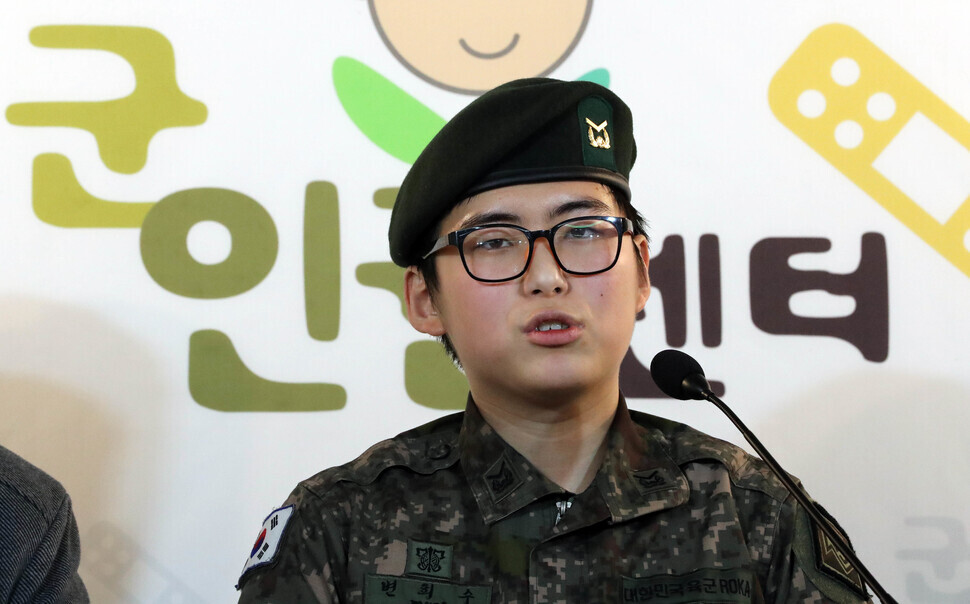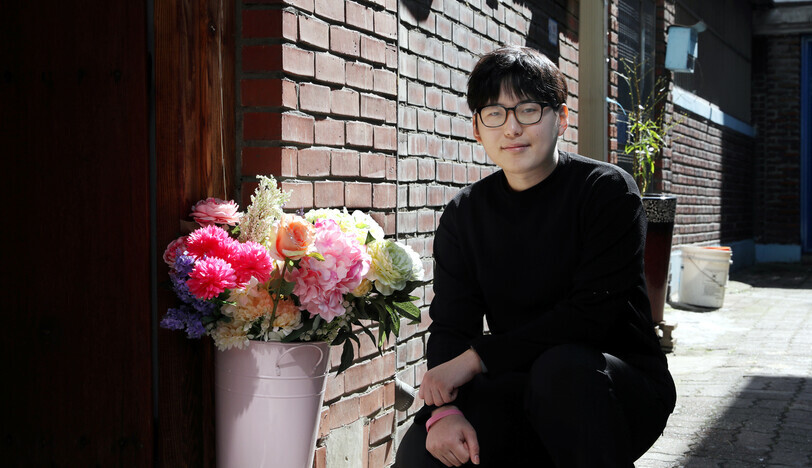hankyoreh
Links to other country sites 다른 나라 사이트 링크
Discharged transgender soldier found dead

Byun Hee-soo, a 23-year-old South Korean soldier who was forced to leave the military after undergoing gender confirmation surgery, was found dead in her home in the Sangdong District of Cheongju, in North Chungcheong Province, on Wednesday.
Sources with the police and the fire department told the Hankyoreh that firefighters found the former soldier dead when they visited her house at 5:49 pm that day.
Staff at a mental health center in Cheongju’s Sangdang District where Byun had received counseling told the fire department they hadn’t heard from Byun since Sunday and were concerned she might endanger herself. The authorities haven’t found a suicide note.
The police explained that Byun had moved to Cheongju last year after she was forcibly discharged from the army. “She didn’t get in touch with her family very often, and she reported high levels of stress in her counseling sessions. Our understanding is that the mental health center had been monitoring her closely,” a source with the police said.
Born in Cheongju, Byun became a sergeant in the South Korean army in 2017. She received a gender confirmation surgery in Thailand in 2019.
While Byun wanted to continue serving in the military, the army decided that her gender confirmation constituted a serious mental and physical disability. Her case was referred to the discharge review panel, which decided in January 2020 that Byun should be discharged.
On Jan. 20, 2020, two days before the panel was set to review her case, Byun filed a petition with the National Human Rights Commission of Korea (NHRCK). In her appeal for emergency relief, Byun asked for the discharge review, which she said was unfair, to be halted.
The next day, on Jan. 21, the NHRCK decided to grant Byun’s request and advised army headquarters to delay the discharge review panel for three months, but the army went ahead with the review.
Byun also filed an administrative lawsuit against the army.
In a plenary session on Dec. 14, 2020, the NHRCK recommended that the army chief of staff reverse Byun’s forcible discharge from the army on the grounds that it constituted a human rights violation. The NHRCK further advised the Minister of National Defense to take institutional steps to ensure that no one else suffered as Byun had.
In its recommendation, the NHRCK said that the army, by discharging Byun, had violated her freedom to carry out her job. “The army discharged the victim by arbitrarily defining gender confirmation surgery as a factor in mental and physical disability, without any clear legal grounds for doing so,” the NHRCK said.
“Nor could we find any grounds for concluding that Byun’s physical condition was ‘not appropriate for active-duty service.’”
“We’ve learned that Byun Hee-soo, a transgender soldier, has passed away. Staff from the center are heading to [Byun’s] house to figure out the details of the situation. We’ll post an update later,” wrote Lim Tae-hun, director of the Center for Military Human Rights Korea, on Wednesday evening.
The tragedy followed the death on Feb. 24 of Kim Gi-hong, 38, an LGBTQ activist on Jeju Island and co-chair of the organization committee of the Jeju Queer Culture Festival.
“I’m so tired. I’m tired of life and of the transphobia I’ve endured and the hatred directed at me,” wrote Kim, who identified as nonbinary transgender, in a final message to friends and family.
Along with being a flutist and a music teacher, Kim was a politician who stood twice on the proportional list of the Green Party.
In February 2020, Kim delivered a speech endorsing another transgender politician named Lim Pu-reun, a potential candidate for the Justice Party in the general election. During the speech, Kim revealed that two friends had died in the past few months, foreshadowing what would happen to Kim.
“In the LGBTQ community, it’s not uncommon to hear about people dying or trying to kill themselves. […] That’s because of the huge barriers that we face,” Kim said.
“Kim’s death shows not only how painful hatred and discrimination are to LGBTQ people, but also that it’s our duty as a society not to ignore their pain any longer,” the NHRCK said, expressing its condolences.
By Oh Yoon-joo, staff reporter

Please direct comments or questions to [english@hani.co.kr]

Editorial・opinion
![[Column] Park Geun-hye déjà vu in Yoon Suk-yeol [Column] Park Geun-hye déjà vu in Yoon Suk-yeol](https://flexible.img.hani.co.kr/flexible/normal/500/300/imgdb/original/2024/0424/651713945113788.jpg) [Column] Park Geun-hye déjà vu in Yoon Suk-yeol
[Column] Park Geun-hye déjà vu in Yoon Suk-yeol![[Editorial] New weight of N. Korea’s nuclear threats makes dialogue all the more urgent [Editorial] New weight of N. Korea’s nuclear threats makes dialogue all the more urgent](https://flexible.img.hani.co.kr/flexible/normal/500/300/imgdb/original/2024/0424/7317139454662664.jpg) [Editorial] New weight of N. Korea’s nuclear threats makes dialogue all the more urgent
[Editorial] New weight of N. Korea’s nuclear threats makes dialogue all the more urgent- [Guest essay] The real reason Korea’s new right wants to dub Rhee a founding father
- [Column] ‘Choson’: Is it time we start referring to N. Korea in its own terms?
- [Editorial] Japan’s rewriting of history with Korea has gone too far
- [Column] The president’s questionable capacity for dialogue
- [Column] Are chaebol firms just pizza pies for families to divvy up as they please?
- [Column] Has Korea, too, crossed the Rubicon on China?
- [Correspondent’s column] In Japan’s alliance with US, echoes of its past alliances with UK
- [Editorial] Does Yoon think the Korean public is wrong?
Most viewed articles
- 1[Column] Park Geun-hye déjà vu in Yoon Suk-yeol
- 2Thursday to mark start of resignations by senior doctors amid standoff with government
- 3N. Korean hackers breached 10 defense contractors in South for months, police say
- 4Kim Jong-un expressed ‘satisfaction’ with nuclear counterstrike drill directed at South
- 5[Editorial] New weight of N. Korea’s nuclear threats makes dialogue all the more urgent
- 6Will NewJeans end up collateral damage in internal feud at K-pop juggernaut Hybe?
- 7[Column] ‘Choson’: Is it time we start referring to N. Korea in its own terms?
- 8[Editorial] Japan’s rewriting of history with Korea has gone too far
- 9[Cine feature] A new shift in the Korean film investment and distribution market
- 10[Column] The president’s questionable capacity for dialogue